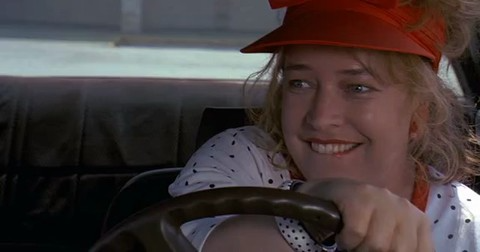
Few moments in cinema combine humor, catharsis, and empowerment as perfectly as Kathy Bates’s “Towanda!” scene in Fried Green Tomatoes. This is not just a car crash; it’s a life-altering release for her character Evelyn Couch and a testament to Bates’s mastery of timing, emotion, and presence. Let’s unpack the origins, impact, and legacy of this unforgettable moment.
1. Setting the Stage: Evelyn Couch’s Journey
Evelyn Couch, a timid, insecure housewife, begins the story feeling invisible and powerless. Meeting Ninny Threadgoode and hearing tales of Whistle Stop transforms her perception of herself. By the time the Towanda! moment occurs, Evelyn is teetering on the edge of self-realization, ready to embrace boldness she never knew she had.
2. Whistle Stop Stories: Idgie’s Influence
Idgie Threadgoode, Ninny’s younger self, embodies defiance, independence, and unapologetic living. Her catchphrase “Towanda!” is a spontaneous exclamation of empowerment—a verbal exclamation point that signals rebellion against injustice, constraint, or frustration. This ethos becomes the spark that Evelyn channels in the parking lot scene.

3. The Parking Lot Scene: A Cinematic Turning Point
The scene takes place in a grocery store parking lot. Evelyn patiently waits for a parking spot, only to have it stolen by entitled young women. Frustration boils over, and she shouts “Towanda!” before intentionally ramming their car four times. Her quip, “Face it girls, I’m older and I have more insurance,” adds humor while asserting dominance.
-
Why it works: It’s relatable, bold, and visually striking. Viewers simultaneously cheer, laugh, and revel in her audacity.
4. Themes of Self-Assertion and Rebellion
-
Empowerment: Evelyn seizes control of her life in a symbolic act.
-
Defiance Against Ageism: The line about insurance underscores that age doesn’t equate to weakness.
-
Emotional Release: Years of pent-up frustration find a release through action.
5. Origin of the Word “Towanda”
“Towanda” wasn’t a pre-existing catchphrase. It emerged as Idgie’s unique exclamation in the Whistle Stop stories. Within the narrative, it symbolizes liberation, eccentricity, and a refusal to conform. Kathy Bates channels it as Evelyn’s personal anthem of rebellion.
6. Kathy Bates’s Performance: Timing is Everything
Bates masterfully builds the scene:
-
Patience and Tension: The pause as Evelyn observes the girls sets up the comedic and emotional payoff.
-
Explosion of Power: Her shout of “Towanda!” and deliberate car ramming release this tension, giving audiences a visceral thrill.
-
Subtle Humor: Lines like “I’m older and I have more insurance” mix wit with empowerment.
7. Writing and Directing Behind the Scene
Screenwriter Carol Sobieski and director Jon Avnet crafted this scene to showcase Evelyn’s evolution. It’s more than a punchline—it’s a pivotal narrative moment, transitioning Evelyn from passive to active agency. Casting the young women as smug antagonists heightens the payoff, giving Evelyn’s act added cathartic resonance.
8. Why the Scene Resonates Culturally
-
Universality: Everyone has felt disrespected and longed for a dramatic, satisfying release.
-
Empowerment Moment: Shows that women—especially older women—can claim power in unexpected ways.
-
Memorability: Bold visuals, comedic timing, and emotional truth make it endlessly quotable.
9. The Scene’s Role in Character Development
-
Evelyn’s Transformation: The act propels her into newfound confidence, setting the stage for further growth.
-
Shift from Victim to Hero: No longer invisible, Evelyn asserts herself physically and emotionally.
-
Foreshadowing Bold Decisions: The scene signals that Evelyn will continue making brave choices.
10. Behind the Camera: Crafting the Perfect Shot
-
Close-ups capture the tension on Evelyn’s face.
-
Wide shots show the dramatic car impact, exaggerating her defiance.
-
Timing between her shout and the car rams blends humor with catharsis, a hallmark of Bates’s performance style.
11. Humor and Catharsis: Why They Work Together
The scene balances comedy and emotional release:
-
The absurdity of ramming a car juxtaposes with the seriousness of Evelyn’s long-suppressed frustrations.
-
Humor prevents the scene from becoming overly aggressive, making it empowering rather than threatening.
-
This balance is part of what makes it timeless.
12. The Scene’s Enduring Legacy
-
Pop Culture Reference: “Towanda!” is now shorthand for moments of assertive rebellion.
-
Empowerment Symbol: Frequently cited in feminist retrospectives as a moment of reclaiming power.
-
Influence on Future Roles: Kathy Bates leveraged this scene to define her on-screen persona as both formidable and relatable.
13. Fan Reactions: Why We Love “Towanda!”
-
Social media and film retrospectives highlight joy at witnessing a character finally stand up for herself.
-
Audiences celebrate the scene as “cathartic,” “hilarious,” and “liberating.”
-
Fans often relate it to personal moments where they wished they could emulate Evelyn’s boldness.
14. Comparisons to Other Iconic Moments in Film
-
Like the shower scene in Psycho, or the whistle in To Kill a Mockingbird, Towanda! combines character development with cultural impact.
-
It’s memorable not for shock or fear but for empowerment and audacity.
-
The scene blends comedy, tension, and narrative significance seamlessly.
15. Lessons for Filmmakers and Actors
-
Build tension before payoff: The audience feels every second of anticipation.
-
Blend humor and emotion: Catharsis is stronger when paired with comedy.
-
Empower the character: Audience empathy peaks when a previously powerless character acts decisively.
-
Timing is everything: Bates’s control over pacing elevates the script.
16. Why “Towanda!” Still Matters Today
Even decades later, the scene resonates because it speaks to universal human desires: standing up for oneself, reclaiming control, and finding joy in defiance. It’s a reminder that empowerment can be both fun and transformative.
-
The scene has inspired parodies, fan recreations, and countless references.
-
It illustrates the enduring power of combining excellent writing with precise acting.
The “Towanda!” scene in Fried Green Tomatoes is far more than a moment of comic relief—it’s the embodiment of personal liberation, empowerment, and unapologetic self-expression. Kathy Bates’s brilliant performance makes the line unforgettable, balancing humor, tension, and emotional truth. It remains one of cinema’s most iconic moments because it captures what we all crave: the courage to finally say, “Enough is enough,” and back it up with action.
